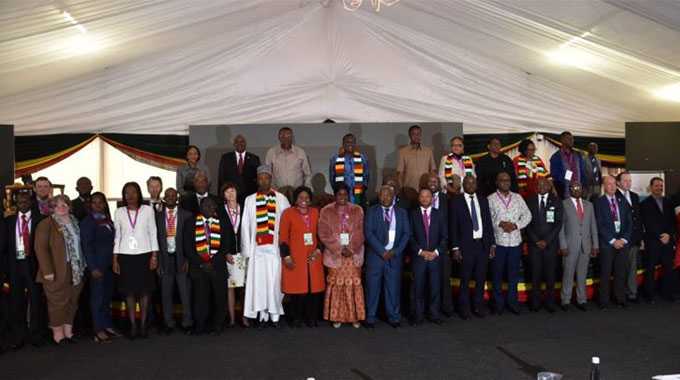Parental guidance vital for responsible youth development

Yoliswa Dube-Moyo
When the late legendary musician Dr Oliver “Tuku” Mtukudzi first released the hit Perekedza Mwana in the 1980s, the youth of that time had to contend with a culture that thrust girls into marriages because they threw caution to the wind and did not meet their parents’ curfew.
Then, it was important for young girls to be home before the sun came down. They had to be home before their fathers made the great trek from their factory job and before their mothers had started cooking dinner.
Mostly common in Nambya and Shona cultures, girls would find themselves in marriages because they came back home late and were told to go back where they were primarily because they could not honour the law of the house.
Their defiance was interpreted as being ready to run their own households. It also meant one less mouth to feed and if the son-in-law was good enough, it meant extra income for the family.
Some deliberately did not go back home in time because they felt they were ready for marriage or were already pregnant and could not be allowed back into their father’s house.
A father’s word was law and the mother was the enforcement agent. When Tuku sang, “Mai vanoti mwana wangu wanga uripi ko, zuva ravira, kunze kwadoka (Your mother will ask where you have been)”, it was during a period when girls should not be roaming the streets after dusk otherwise they were deemed to be of loose morals. They had to be at home helping their mothers who would be grooming them to be good wives some day.
In the 90s, remnants of this culture remained but parents were more sensitive about imposing marriage on their children. As dynamics changed — more children were educated and more parents were gainfully employed and as a result such cultures died down. Instead, the youth, especially girls, were in pursuit of academic excellence and exploiting career opportunities availed to them.
Affirmative action played a critical role in ensuring boys and girls received equal opportunities in schools and universities. More girls studied sciences and commercials as opposed to the arts subjects they were previously restricted to. Sending a girl child to university ceased to be unmentionable as it became more acceptable to educate girls unlike in the past when boys were treated as superior to girls.
Some families would regard it a waste of money to send a girl to school as she would eventually leave the family to be with her husband and consequently be what they regarded “useless” to the family.
Then came the 2000s when a significant number of homes are manned by domestic workers as parents have been pushed out of the country by economic hardship. More and more parents are not around to mould their children in a generation that has become anxious about one thing or the other.
It would seem the family unit has since been dismantled and the moral fabric torn in the process.
“The problem is that parents are too busy to talk to their children. They’re always busy looking for money to make ends meet. They have to queue for fuel and deal with price hikes every now and then. Where do they find the time and energy to counsel their children?” said local clergyman, Pastor Lungile Ngulube.
He said because parents today have to contend with economic hardship, children, especially teenagers are misguided and wind up getting up to no good.
In recent times, vuzu parties have been on the lips of many as teenagers in the city, and around the country, have gone out of control. More than 130 adolescents were recently arrested by the police and arraigned before the courts on charges bordering on disorderly conduct and criminal nuisance.
They were found in possession of drugs and alcohol in transit to a vuzu party where it is said they engage in risky sex orgies. Some reports say other adolescents go to the extent of drugging their parents at night in order to attend these vuzu parties.
“While times are tough, parents need to talk to their children. I always tell my congregants that I’m tired of parents who come crying to me about their children who attend vuzu parties. Some of them drinking and having sex because they have an emotional gap to fill. Don’t be too busy to talk to your children and pray for them as well,” said Pastor Ngulube.
He said Bulawayo is facing a parenting crisis with schools no longer being safe havens.
Schools have become incubation hubs for junkies and adolescent sex continues to be trivialised. The “it takes a village to raise a child” adage is no longer prominent in today’s society.
Back in the township, every woman in the neighbourhood was a child’s mother and had full rights to spank them if they exhibited unruly behaviour.
If a child went home to report the beating, they were likely to be met by yet another spanking. New millennium babies can no longer be beaten because they have “rights”. Corporal punishment has since been outlawed and parenting styles have changed to accommodate the rights of children.
To some, this may seem like a disservice as children are growing up more “liberal” and “uncultured”. Mrs Fiona Mills, a school counsellor, said children all over the world are growing up in an environment of volatility, turmoil and conflict.
“There’s a worldwide rise in children’s anxiety where worries about financial security, safety, fuel and food availability, poor driving standards etc add to normal childhood worries. In an environment where there is any turmoil or instability, consistent and conscious parenting is vital for children’s success – both at school and in the wider world. Your impact on their emotional development is incalculable,” she said.
While times are tough and a significant number of parents are struggling to provide for their children, experts say a parent’s involvement in their child’s life goes a long way in grooming responsible adults.
“It would seem parents today are more burdened than those from previous generations. Added to a challenging economic environment is the introduction of new media which has made the world a global village,” said psychologist, Ms Juliet Moyo.
She said it has become increasingly difficult for parents to keep track of what their children are exposed to due to the advent of the internet.
“How do you control a generation that is a click away from the rest of the world? In earlier times, exposure was limited and children could be controlled easily but nowadays parents have to work extra hard to nurture their children”.
Before long, she said, teenagers will be gathering again at their usual pick up points to the next Vuzu party if parents do not avail themselves more to their children.
“Being a mother myself, I can tell you that children today are more liberal, they ask difficult questions and are always ready to argue their cases. If you don’t raise your child yourself and actually be there for them, emotionally, someone will do the job for you,” said Ms Moyo.
To mitigate the spread of HIV/Aids, prevalence of unwanted pregnancy as well as drug and alcohol use and dependence, it is important that parents and guardians be involved in the lives of their children.
The economy is a work in progress but a life lost cannot be replaced.











Comments